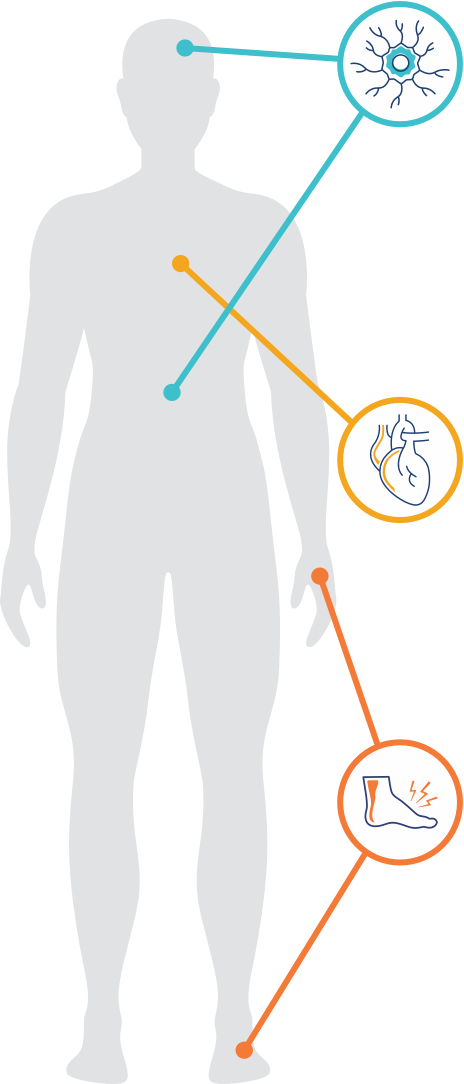What are the symptoms of hATTR amyloidosis?
The symptoms of hereditary ATTR (hATTR) amyloidosis can vary widely among people with the condition and even within families, though some do see a pattern of symptoms develop. Different symptoms may appear at different times for each person.
The age that symptoms of hATTR amyloidosis typically appear ranges from the mid-20s to the mid-60s. Since symptoms of hATTR amyloidosis can become more severe over time, it's important to talk to your doctor about them as soon as possible.
hATTR amyloidosis affects several parts of the body, including:
The peripheral nervous system, which is made up of nerves that branch out from the brain and spinal cord and communicate with the rest of the body, including your arms and legs.
- Nerve damage in the peripheral nervous system results in improper function
The cardiac system, which is made up of the heart and blood vessels, transports blood through veins and delivers oxygen to cells in the body.
- Damage to the heart muscle can lead to heart failure
The autonomic nervous system, which is made up of nerves that connect the brain and spinal cord to organs such as the heart, stomach, and intestines.
- When the autonomic nervous system is not working correctly, it may affect involuntary bodily functions, such as breathing, digestion, and heart rate
Possible symptoms of hATTR amyloidosis

Symptoms related to nerves in hands, feet, arms, and legs
- Tingling
- Numbness
- Carpal tunnel syndrome
- Burning pain
- Loss of sensitivity to temperature
- Loss of movement control
- Weakness

Symptoms related to the heart
- Fatigue
- Dizziness
- Shortness of breath
- Leg swelling (edema)
- Chest pain
Symptoms related to control over bodily functions
- Recurrent urinary tract infections (UTIs)
- Excessive sweating
- Dizziness upon standing
- Sexual dysfunction
- Nausea and vomiting
- Diarrhoea
- Severe constipation
- Unintentional weight loss
This is not a complete list of symptoms that may be experienced in patients with hATTR amyloidosis. Each patient has a different experience and you may not experience all of these symptoms, or you may not experience them at the same time. Symptoms of hATTR amyloidosis may become more severe over time.
Other symptoms
- Glaucoma
- Blurred or spotty vision
- Floaters in the eye
- Detached retina
- Worsening dementia
- Stroke-like episodes
- Kidney dysfunction
The effects of hATTR amyloidosis
The symptoms of hATTR amyloidosis can often have an impact on day-to-day activities. It’s important to keep track of any difficulties you may be experiencing so your doctor has as much information as possible in order to make an accurate diagnosis.
Learn more about talking with your doctor about hATTR amyloidosis »
IN THIS SECTION

Your family and hereditary ATTR amyloidosis
A brochure to help guide important discussions with family and loved ones
